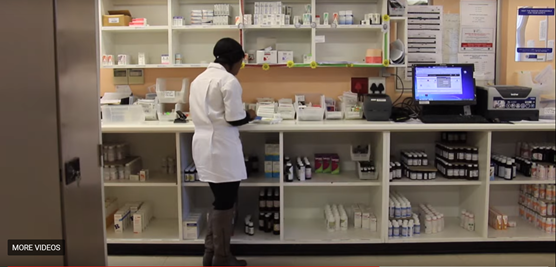

Kheth’Impilo
Sub-Saharan Africa (SSA) has 25% of the world’s HIV disease burden, the highest globally, but only 1.3% of the world’s health workers. This shortage of human resources for health is a critical limitation to the provision of antiretroviral treatment (ART) to those in need of treatment. Pharmaceutical services are understaffed, particularly since the ART programme has expanded rapidly over the last two decades. Hospitals and some primary healthcare clinics have pharmacists; however, at many clinics, medicine is managed and dispensed by nurses or post basic pharmacist assistants (PBPAs).
Thus, Kheth’Impilo embarked on a pharmacist assistant learnership programme with start-up funding from the Elton John AIDS Foundation (EJAF) in 2011. The project aims to address a critical shortage in pharmacy support personnel and thereby improve pharmacy and general health services. This project was implemented in South Africa, in five provinces namely, Western Cape, KwaZulu Natal, Eastern Cape, Free State and Mpumalanga.
Kheth’Impilo, as the prime partner, implemented the project in collaboration with the Department Of Health (DOH), and a nationally accredited training academy. Funding was obtained from several institutions including EJAF, USAID, HWSETA and SASSIX. The programme started in 2011 and the last learners completed training in May 2020 due to the end of funding.

Our Approach
The pharmacist assistant training programme focusses on three unique key features:
- The transformation from unemployment to employment
- An innovative way to training the learners
- Positive outcomes for patients and the health sector.
The training approach followed by Kheth’Impilo is 80% supervised vocational training in an accredited pharmacy and 20% supported learning in a classroom context.
Learners are placed in a registered pharmacy under the direct supervision of a registered government-employed pharmacist where they spend four days of the week. On the fifth day of the week, the learners attend a class where a Kheth’Impilo pharmacist presents to them course work and provides guidance on learning activities and support for additional challenges. This support has been instrumental in ensuring a 95% completion rate of all KI pharmacist assistant learners. Kheth’Impilo further encourages its instructors to adopt a holistic approach in the education of its learners; this is done through providing mentorship and counselling on issues outside the classroom to address the incorporation of life skills. This holistic approach assists learners who come from marginalised communities and those who experience challenges in their personal life, especially financial challenges. Additionally, Kheth’Impilo supports its learners with a monthly stipend during their training.
Stakeholders of Kheth’impilo and roles
Department of Health Placement of learners in suitable pharmacies with government employed pharmacists as tutors | South African Pharmacy Council (SAPC) Governs the accreditation of pharmacist assistant training course |
Service Provider Provides accredited training material and moderation | Funders Contribute to the cause |
Key Results
- 1006 learners received a national accredited qualification (basic and/or post basic)
- 4.5% of the total number of PAs registered with the South African Pharmacy Council (SAPC) by March 2020 were trained by KI
- 491 learners qualified as basic pharmacist assistants (This is obtained once a learner has completed year one of training. One can remain a basic pharmacist assistant, registered with the SAPC, and work with a limited scope of practice)
- 515 learners qualified as post-basic pharmacist assistants (This is obtained after completing year two of training. The scope of practice for a PBPA is greater than for a basic PA and allows the PBPA to work in primary healthcare setting)
- The learners supported more than 657 864 patients per month of whom more than 133 643 were on ART.
- A survey conducted in 2018 indicated that of the 443 qualified PBPAs, 91% were employed. 81% in the public health sector.

Lessons Learnt (Success Factors & Challenges)
- Strong working relationships with all stakeholders. Communication and clear roles and responsibilities are key.
- Stakeholders need to understand the win-win situation- needs clarification and sometimes post-implementation evaluation to get the full benefit that continues for the life of the graduate, their family as well as the service they support and the patients they serve.
- The attitude and willingness of the Kheth’Impilo pharmacists who act as facilitators for the learners and make a contribution to the success of the learnership imbuing a sense of professionalism critical for this role.
- The young candidates, mostly from marginalised communities, are eager to learn often under difficult circumstances.
Challenges/ barriers
The greatest challenge throughout the programme period is to get the learners registered with the pharmacy council as soon as possible after they sign their contracts and to have no disruption of services. Unfortunately, disruptions still appear due to staff (tutors) turn over (Resigning/leaving the facility, in which case the learner need to be placed and registered with a new tutor)
Moving Forward
Kheth’Impilo has successfully implemented the Pharmacist assistant learnership across five provinces in South Africa during the last decade and seeks to scale the programme to more provinces and potentially other Sub-Saharan Africa countries
Kheth’Impilo is supporting the development of an e-learning platform to support the upskilling of PBPAs to become Pharmacy technicians as is the policy of the NDoH and SAPC. This is a long term project and does require support for execution and implementation. The basic PA and post-basic PA qualifications will need to be upgraded as a segue to becoming Pharmacy technicians.
Resources
https://www.youtube.com/watch?v=Cs1lYHYi5lw&feature=youtu.be
https://socialinnovationinhealth.org/downloads/Case_Studies/KhethImpilo_Pharmacist_Assistant_Training_Programme_SIHI_Case_Collection.pdf http://journals.lww.com/jaids/Fulltext/2016/04010/Implementation_and_Operational_Research___A.13.aspx


